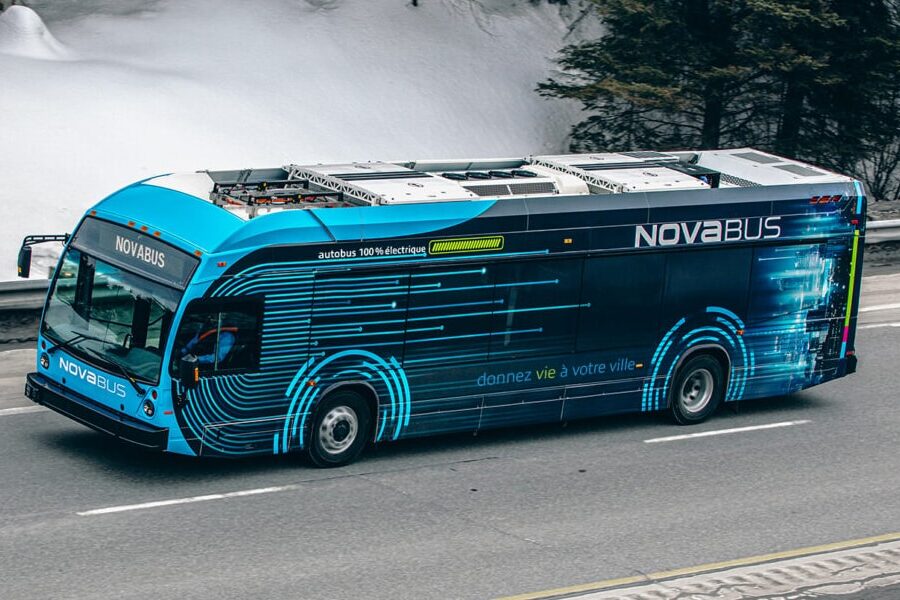Volvo’s Nova Bus secures massive order for electric buses in Canada
Nova Bus, the North American subsidiary of Volvo, has received a group order to supply up to 1,229 battery-electric buses to ten public transport operators in Quebec, Canada. The vehicles are set to be delivered between 2025 and 2027.
++ This article has been updated; please continue reading below. ++
The initial order comprises 339 LFSe+ electric twelve-meter bus units, with options for an additional 890 electric buses. The Canadian government subsidizes the procurement with CAD 780 million and the government of Quebec with a further CAD 1.1 billion, amounting to around €1.3 billion.
The LFSe+ is based on the well-known stainless steel structure of the LFS model, and the revised electric version can be equipped with batteries of up to 564 kWh. Using a pantograph, the battery is charged via cable at the depot or on the go. Compared to the LFSe, the LFSe+ uses a different electric drive with ZF axles and offers slightly higher passenger capacity.
It is unclear from Nova Bus’s announcement which battery option the public transport operators have chosen or whether all vehicles are configured the same. The LFSe+ frames for this order will be built in Saint-François-du-Lac, and the buses will be assembled at the Saint-Eustache plant in Quebec.
The Quebec government’s plan stipulates that public transport companies in the province will only purchase e-buses from 2025 onwards. By 2030, 55% of city buses, 65% of school buses, 40% of taxis, and 35% of private cars are to be electrically powered. The government of Quebec aims to switch all of its cars, SUVs, vans, and minivans to electric drives by 2030, as well as 25% of its trucks.
In recent years, other Canadian provinces have also seen significant procurement projects for electric buses. For instance, Toronto plans to purchase 340 electric buses, while Calgary aims to procure nearly 300 in four years. In Ottawa, Ontario, up to 350 electric buses are scheduled for procurement, although these examples concern individual cities rather than an aggregated group order, such as in Quebec.
Update 08 June 2023
BAE Systems today announced that Nova Bus has opted to utilize its Gen3 electric drive systems for integration on the buses in the above order. The battery-electric bus order remains the largest to date in North America and builds on the 1,800 buses in the province already powered by BAE Systems’ technology.
Gen3 features an electric motor and power electronics. The system uses technology, such as silicon carbide, to improve heat management, lightweight components, and increased electrical efficiency. Using a flexible design, the reduced number of connections creates a compact system and allows the buses to travel longer distances on a single charge, informs BAE.
“This order represents our collective commitment to improving air quality, meeting the provincial government’s ambitious targets and contributing to Canada’s zero-emission future,” said Marc-Andre Varin, general manager of ATUQ, which represents public transportation organizations that serve major urban centres in Québec. “BAE Systems has been with us from the beginning of our journey, starting with electric hybrids and now the switch to all-electric buses. This is a big leap forward in our plans to provide sustainable transit service.”
novabus.com, newswire.ca, baesystems.com (update June ’23)





0 Comments